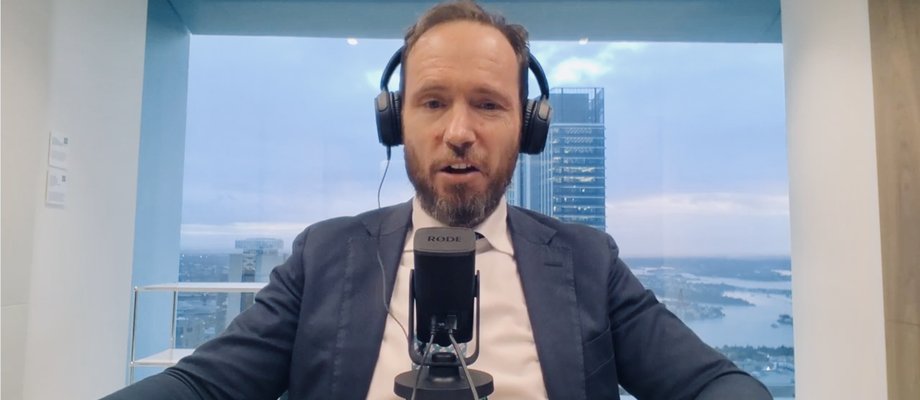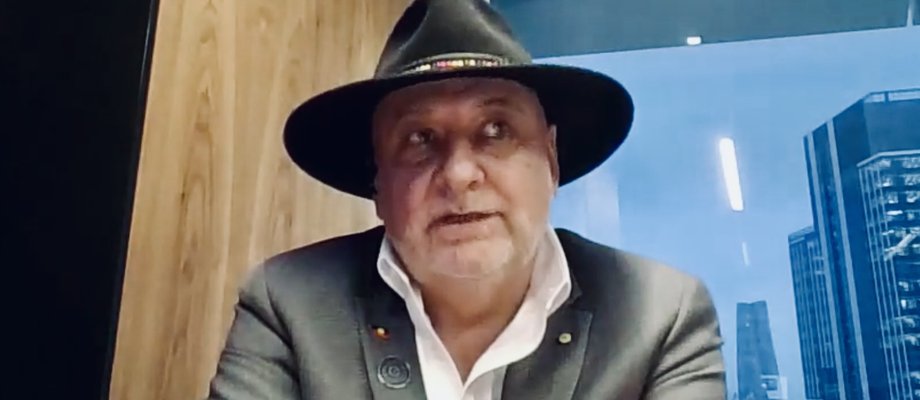In the fourth episode of the new series of the Upfront podcast, Emmanuel Asuquo talks to Deloitte's John O'Mahony and Prof. Deen Sanders about the findings of their new report Advice 2030: The Big Shift which looks at the future of the financial advice market and the choices advisers must make now if they're to be part of it.
Here are some highlights from that conversation. Listen to the episode in full here.
Emmanuel: What's shaking up the financial advice sector, and is the industry ready for it?
Deen: What's shaking up financial advice is complexity. Complexity for the marketplace, complexity for clients, complexity for advisers, basically a big wall of increasing complexity in those environments.
John: What we're trying to do is shift from just talking about complexity to the choices facing financial advisers. Who do financial advisers choose to work with and advise, what technology they're going to use, where to specialize, and we hope that helps empower financial advisers to take some action.

Emmanuel: I love this. 'Cos when you said complexity, all I felt was regulation and compliance. That is the thing that bugs my brain every single day and makes me think, do I still want to be an adviser? 'Cos, it feels like everything is a problem. So what situation do financial advisers find themselves in right now?
John: In some respects, the picture for financial advisers isn't positive. We've gone through dramatic industry consolidation. That means a lot of financial advisers leaving the industry, for what you said earlier, fed up with the level of regulation, fed up with what the returns can be for their businesses. But there's good news in there as well. We've already seen the plateauing, the stabilization in the number of financial advisers, we've seen returns recover to what they were in the pre COVID era in the last 12 months. And we've seen optimism for growth; financial advisers expect an extra 25 per cent growth in their customer base over the next five years. If that plays out, the problem isn't going to be a lack of customers. The problem is there'll be too many customers. Financial advisers will have to work out for themselves who they want to work with and how they can service them efficiently.
Financial advisers expect an extra 25% growth in their customer base over the next five years. The problem isn't a lack of customers. The problem is there will be too many customers.
Partner, Deloitte Access Economics
Deen: And Emmanuel, I want to try and rehabilitate the word complexity for you so it no longer scares you. You're quite right to call out the industry, and it's important to reflect that we are, of course, talking here about data that emerges from the Australian financial advice landscape, but it has a lot of synergy with the UK market. Complexity, as we've seen, has been playing out for the sector, both in Australia and in the UK, through the lens of regulation and internal change. Basically, the industry being at war with itself and with its regulators. The big shift in this conversation is recasting that complexity to focus on what's coming from the outside. The good news is that complexity in terms of the type of clients and market means enormous opportunities for unmet needs and the increasing complexity of that unmet need, which is the perfect space for professional advisers to play.
Emmanuel: That's amazing. What you're saying is so valid, and it's great that there's hope going forward. Advisers are not the only ones that are having it tough. Everyone's got it tough with the cost of living crisis and what's going on in the world. How will financial advisors need to adapt, I guess, is the question.
John: Well, I want to debate you on that point. I think it's fair to say that most people are, but by some metrics, there are other people who are actually doing quite fine in the current environment. The number of people in Australia who, by an objective measure, might be considered rich has grown over the last few years. We've got a standard measure for it. A sophisticated investor asset level of two and a half million dollars. It's about half that in pounds. 1. 5 per cent of the Australian population passed that threshold 20 years ago. Now, it's almost 10 times that level. 12 per cent of folks have that level of assets. And in the next decade, it's going to double again to 20%. So, if you think about the large asset base that needs financial advice, there's enough money there to pay for proper advice. Now, that's not everybody, but there is quite a market out there for financial advisers. This is not to say, of course, that that's the end of the story. There's an enormous need to expand financial advice so that other folks who need to get on the wealth ladder are able to grow their assets as well.
Emmanuel: Professor Deen, please come in here. John mentioned the advice gap - the rich getting richer. How do you see financial advice playing? Should we just focus on the really wealthy?

Deen: Well, it certainly is going to be the conundrum of the future. Populations globally are aging. We're also spreading the assets and the income differently and unequally. One of the things we called out in the report is intergenerational wealth transfer. We've been hearing that for a long time in financial advice. But it is a tidal wave about to hit, and what's really challenging about that is it's not just a tidal wave of money shifting from elderly parents to younger middle-aged parents. It's the fact that we now live in households of four generations. So we have internal conflict. We have internal complexity in some of these families, where everybody's sitting around the kitchen table wanting a slice of Mum and Dad's depleting assets because they can't get onto the housing ladder themselves. So the role of a financial adviser is also shifting away from the straightforward asset and investment models into, frankly, family dynamics. We're seeing more call for a life coach, a family coach, a trusted central advisor to families, that's a really exciting shift to think about what the future of financial advice looks like.
Emmanuel: And do you feel there's a need for financial advisers to retrain?
Deen: Absolutely. John mentioned at the top of our conversation that we wanted this report not to be scary because that was never the intention, or even just educative. We wanted to make sure we were talking about opportunities and, and pathways and choices. In the report, we've sort of diagnosed that future as four choices advisers can make about their business, and one of them is the type of specialization skills they will need. And, importantly, with whom they want to work. In the past, it was the financial adviser trying to be everything to every client, but in a complex market, you can't be. And, of course, all of that is underpinned by the technology platforms you want to engage with. So they're the four choices, customers, business models, specialization and technology.
We're seeing the role of financial adviser shifting away from straightforward asset and investment models into, frankly, family dynamics. That's a really exciting shift.
Partner, Deloitte Access Economics
Emmanuel: I love that. But John, if we're competing with online platforms and robo advisors, and having to reduce our costs, can we reduce our costs and then offer more of the services outside of ourselves?
John: What we find is that the different megatrends have different implications. Some of them are the large customer base, repeat product, low-fee, highly competitive environment. But then there are other megatrends that will go in the opposite direction, and there's an opportunity for higher fees and personalisation. For some of these products, it's 10 to 50 per cent more than what's being charged at the moment. So there is a margin there. It just depends on what choices financial advisers make. There isn't one answer to that question and that's why we've got a handy map in the report to try to help them through the answer.
Deen: We don't see a shrinking of the market. We're seeing a growing sophistication of the market, which opens up the possibility for the first time in a long time for advisers to pay to be paid for their expert advice rather than for product-linked advice, and I look forward to seeing that same debate in the UK.
Emmanuel: This is fantastic. I really hope what people are taking away is actually choosing your market. For a long time as financial advisers, we've taken whatever we can get. As opposed to actually now saying who you want to work with. What threats do advisors need to be thinking about? How do we make sure that we don't get pushed out of the way or start to lose clients?

I really hope what people are taking away from this is actually choosing your market. For a long time as financial advisers, we've taken what we can get.
Host
John: As a starting point, I'd suggest the best place that financial advisers can go to improve their likelihood of success is inside their own business. That is not looking over their shoulder at what competitors are doing. This research puts the power back in the hands of financial advisers and says if you make the right choices with customers, with people, and with technology, you can succeed. Where are the threats likely to come from? Some of it will be traditional players using technology better than you. Another threat is adjacent businesses that are likely to do more in financial advice. The superannuation sector in Australia doesn't provide a lot of financial advice at the moment, but it could be a way of distributing and getting access to clients. There's a third one, which is unregulated financial information. But really, the biggest threat to financial advisers is inaction by themselves.
Deen: The encouragement is that if you're looking around and things are pretty quiet, they're not quiet. You're looking in the wrong direction.
This research says if you make the right choices with customers, with people and with technology, you can succeed.
Partner, Deloitte Access Economics
Deen: I don't want to frighten people into making change. I want to encourage them to think about the opportunity for change. It's unwise to sit still when there is so much opportunity just around the corner if they position themselves well for it.
Emmanuel: All right. As an adviser myself, I feel excited and empowered. The future looks a lot brighter than it felt before we started this conversation. Are there some quick wins?
John: I've got three for you, Emmanuel. The first one is to do some experimentation with technology choices. It would be remiss not to kick off there. Some early experimentation with AI and having a conversation with clients about what levels of technology use they're comfortable with is a pretty sensible starting point for financial advisers if they haven't made changes in their business for a long time. A second one is to think about which customers you would like to serve. Then the third one, I don't know if it's a quick win, is more education in yourself.

Emmanuel: So I guess, to round up, do you guys have a kind of rally cry built out from what this report is saying going forward?
John: Stick at it. We do lots of research reports across different industries, and what we've got in here for potential 25 per cent growth in customers is amazing. If I can put in a humble plug, it would be for financial advisers to download this report. It's big, but there's a short version that's like five pages where you can see what the trends are and some actions to take.
Deen: There is a new world of opportunity sitting there. It's just coming. It's absolutely coming. The big shift is on. Grab the report and have a read of it. We want more people activated in thinking about the future because we think it's a bright one.
Listen to this episode here or wherever you get your podcasts.
Now read the report
Advice 2030: The Big Shift
Together with Deloitte Access Economics, Iress brings you Advice 2030: The Big Shift, a landmark study of the Australian advice market. It uncovers seven societal megatrends set to usher in a potential $2.1bn in new revenue and half a million new clients by 2030. The report unpacks the opportunities that will influence customer expectations and advice business models in the next five years and the four choices advisers will need to make in order to thrive and prosper in this new world of advice.
Loved this?
Then listen up
Upfront is the award-winning podcast for the financial services industry brought to you by Iress. Series 3 is out now, featuring 10 brand new episodes and conversations that everyone working in financial services needs to hear. Listen to Upfront on your favourite podcast app and follow so you never miss an episode.





